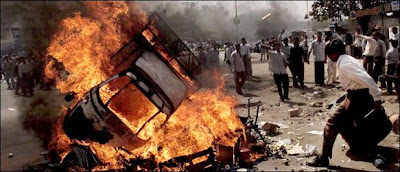The embarrassing praise and adoration that the media is pouring on Obama after his “speech to the Muslim world” in Cairo is proof that liberals no longer have a voice in public policy.
Instead, we are left with a pseudo-debate between the right and the center, with spin doctors trying to convince Americans (and even the Arab press) that what Obama said in Cairo was somehow different from what George W. Bush ever said.
Obama made several key points – most notably about the Israeli/Palestinian issue, the notion of an American “War on Islam,” and Iran’s nuclear program.
But there was nothing new. Nothing that the world hasn’t already heard from Bush.
When Bush made his speeches, some of the media – and certainly the rest of the world outside of the U.S. – screamed and hollered about human rights, fascism, imperialism, and hypocrisy.
Why the sudden change of heart with Obama? Is it our president’s skin color? His family’s religious history? His tone? The fact that our new president hasn’t started any new wars – just continued the old ones?
Or is it the hope that a new president symbolizes in a world being torn apart by polarized ideologies and hatred?
Because Obama’s speech clearly showed that policy hasn’t changed. Just the messenger.
Consider the comparisons…
- On the “War against Islam”:
OBAMA: …America is not – and never will be – at war with Islam. We will, however, relentlessly confront violent extremists who pose a grave threat to our security – because we reject the same thing that people of all faiths reject: the killing of innocent men, women, and children.
BUSH: Ours is a war not against a religion, not against the Muslim faith. But ours is a war against individuals who absolutely hate what America stands for…we must work together to defend ourselves. And by remaining strong and united and tough, we'll prevail.
(November 20, 2002 press conference in Prague, Czech Republic)
- On permanent military bases and withdrawal of troops:
OBAMA: Now, make no mistake: We do not want to keep our troops in Afghanistan…we seek no military bases there…We would gladly bring every single one of our troops home if we could be confident that there were not violent extremists in Afghanistan and now Pakistan determined to kill as many Americans as they possibly can. But that is not yet the case…
BUSH: We won't have permanent bases.
(February 10, 2008 interview at Camp David, Maryland with FOX News)BUSH: And setting an artificial deadline to withdraw would vindicate the terrorist tactics of beheadings and suicide bombings and mass murder and invite new attacks on America…We will not permit Al Qaeda…a safe haven for terrorism and a launching pad for attacks on America…We will not turn that country over to the terrorists and put the American people at risk.
(November 30, 2005 speech at the U.S. Naval Academy in Annapolis, Maryland)
- On U.S.-Israel ties:
OBAMA: America's strong bonds with Israel are well known. This bond is unbreakable. It is based upon cultural and historical ties, and the recognition that the aspiration for a Jewish homeland is rooted in a tragic history that cannot be denied.
BUSH: And the United States will keep its commitment to the security of Israel as a Jewish state and homeland for the Jewish people.
(November 27, 2007 speech at the Annapolis Conference in Maryland)BUSH: …America is proud to be Israel's closest ally and best friend in the world. The alliance between our governments is unbreakable, yet the source of our friendship runs deeper than any treaty. It is grounded in the shared spirit of our people, the bonds of the Book, the ties of the soul.
(May 15, 2008 speech to the Israeli Knesset)
- On the situation in Palestine:
OBAMA: The situation for the Palestinian people is intolerable.
BUSH: It is untenable for Palestinians to live in squalor and occupation.
(June 24, 2002 speech in the Rose Garden at the White House)
- On a two-state solution:
OBAMA: The only resolution is for the aspirations of both sides to be met through two states, where Israelis and Palestinians each live in peace and security.
BUSH: My vision is two states, living side by side in peace and security.
(June 24, 2002 speech in the Rose Garden at the White House)BUSH: We meet to lay the foundation for the establishment of a new nation, a democratic Palestinian state that will live side by side with Israel in peace and security.
(November 27, 2007 speech at the Annapolis Conference in Maryland)
- On the Road Map and responsibilities:
OBAMA: The obligations that the parties have agreed to under the road map are clear. For peace to come, it is time for them – and all of us – to live up to our responsibilities.
BUSH: [W]e reaffirm the path to peace set out in the road map… The success of these efforts will require that all parties show patience and flexibility and meet their responsibilities.
(November 27, 2007 speech at the Annapolis Conference in Maryland)
- On Palestinian violence:
OBAMA: Palestinians must abandon violence. Resistance through violence and killing is wrong and it does not succeed.
BUSH: A Palestinian state will never be created by terror -- it will be built through reform.
(June 24, 2002 speech in the Rose Garden at the White House)BUSH: …the terror and violence preached by Palestinian extremists is the greatest obstacle to a Palestinian state.
(November 27, 2007 speech at the Annapolis Conference in Maryland)
- On the role of Hamas:
OBAMA: Hamas…have to recognize they have responsibilities. To play a role in fulfilling Palestinian aspirations, to unify the Palestinian people, Hamas must put an end to violence, recognize past agreements, recognize Israel's right to exist.
BUSH: And we will continue to deliver a firm message to Hamas...you must reject violence, and recognize Israel's right to exist, and commit to all previous agreements between the parties.
(July 16, 2007 speech at the White House)
- On Israeli settlements in the West Bank:
OBAMA: The United States does not accept the legitimacy of continued Israeli settlements. This construction violates previous agreements and undermines efforts to achieve peace. It is time for these settlements to stop.
BUSH: And consistent with the recommendations of the Mitchell Committee, Israeli settlement activity in the occupied territories must stop.
(June 24, 2002 speech in the Rose Garden at the White House)BUSH: Israel must demonstrate its support for the creation of a prosperous and successful Palestinian state by removing unauthorized outposts, ending settlement expansion…
(November 27, 2007 speech at the Annapolis Conference in Maryland)
- On threats to Israel’s security:
OBAMA: [T]he continuing humanitarian crisis in Gaza does not serve Israel's security; neither does the continuing lack of opportunity in the West Bank. Progress in the daily lives of the Palestinian people must be a critical part of a road to peace, and Israel must take concrete steps to enable such progress.
BUSH: Permanent occupation threatens Israel's identity and democracy. A stable, peaceful Palestinian state is necessary to achieve the security that Israel longs for. So I challenge Israel to take concrete steps to support the emergence of a viable, credible Palestinian state.
(June 24, 2002 speech in the Rose Garden at the White House)
- On Arab states’ normalization with Israel:
OBAMA: [T]he Arab states must recognize that the Arab Peace Initiative was an important beginning, but not the end of their responsibilities. The Arab-Israeli conflict…must be a cause for action…to choose progress over a self-defeating focus on the past.
BUSH: And as we move toward a peaceful solution, Arab states will be expected to build closer ties of diplomacy and commerce with Israel, leading to full normalization of relations between Israel and the entire Arab world.
(June 24, 2002 speech in the Rose Garden at the White House)BUSH: Arab states should also reach out to Israel, work toward the normalization of relations and demonstrate in both word and deed that they believe that Israel and its people have a permanent home in the Middle East.
(November 27, 2007 speech at the Annapolis Conference in Maryland)
- On U.S.-imposed peace:
OBAMA: America will align our policies with those who pursue peace, and we will say in public what we say in private to Israelis and Palestinians and Arabs. We cannot impose peace.
BUSH: America will do everything in our power to support [the Arabs/Israelis] quest for peace, but we cannot achieve it for them.
(November 27, 2007 speech at the Annapolis Conference in Maryland)
- On Iran’s nuclear program:
OBAMA: And any nation – including Iran – should have the right to access peaceful nuclear power if it complies with its responsibilities under the nuclear Non-Proliferation Treaty.
BUSH: Iran must abandon its nuclear weapons ambitions…[however] we have no objection to Iran's pursuit of a truly peaceful nuclear power program.
(September 19, 2006 speech to the U.N. General Assembly)
Meanwhile, despite the rhetoric being exactly the same, some media are attacking Obama as insufficiently supportive of Israel (read: anti-Semitic) by skewing facts and using selective memory. They accuse Obama of “alienating” Israel, of making concessions, or of unfairly blaming one side over another.
Essentially, after repeating almost verbatim what George W. Bush said for eight years, the only criticism of Obama is that he’s not conservative enough.
The lack of a liberal critique in the media – and the complete acceptance of whatever Obama says regardless of content - is an indication of the of malignant conservatism that has taken root in the American foreign policy debate. A true debate – beginning with real journalism – would stimulate discussions about why America is continuing with a foreign policy that has obviously and very publicly failed over the past decade.
It was just a speech – not action – and no doubt it will take more than words to heal the rift between East and West, Christian and Muslim.
But we will never begin the healing as long as the same failed policies and empty rhetoric remain.
Wil Robinson
AWOP International Consulting Editor
Author of International Political Will Blog
**************************
Pick your poison: Use the Share/Save button below to save this post or share it with your friends.
Peace Y'all







![[...Kangchenjunga is the world's third highest mountain at 28,169 feet...]](http://www.internationalpoliticalwill.com/wp-content/uploads/2009/05/kach1_1.jpg)
![[...my trekking guide, Milan, warms himself next to the kitchen fire...]](http://www.internationalpoliticalwill.com/wp-content/uploads/2009/05/kitchen_1.jpg)
![[...on a 12,000-foot peak, prayer flags and a shrine overlook Mt. Everest to the west...]](http://www.internationalpoliticalwill.com/wp-content/uploads/2009/05/everest_1.jpg)

![[...one of the better sections of road in West Bengal, our jeep got a flat...]](http://www.internationalpoliticalwill.com/wp-content/uploads/2009/05/cartrouble_1.jpg)































